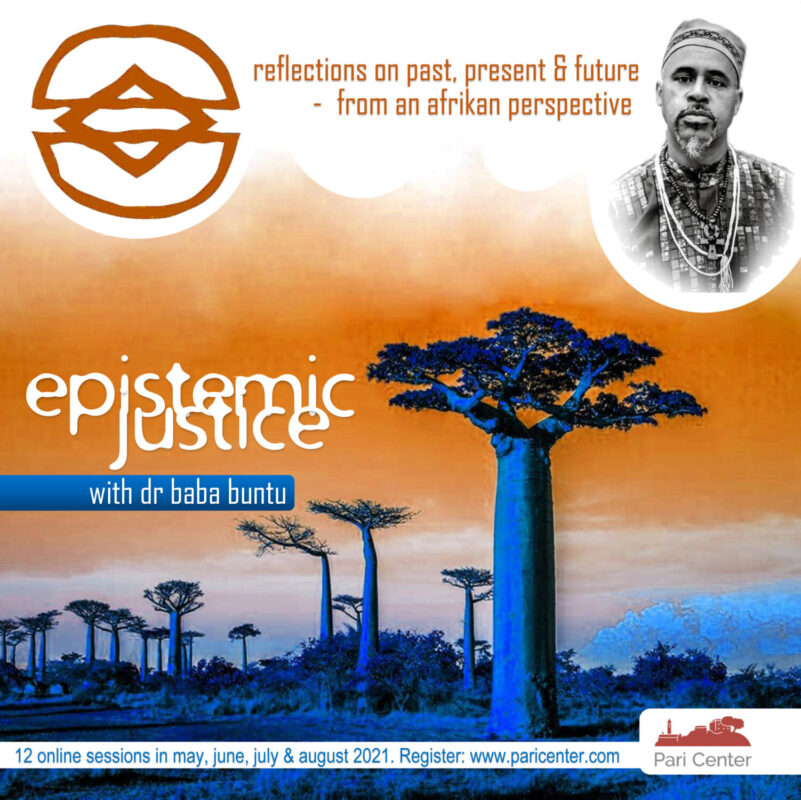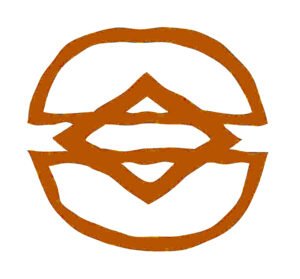Your cart is currently empty!

Epistemic Justice
- This event has passed.
June 16, 2021 @ 7:00 pm – 8:00 pm CEST

Epistemic Justice
Reflections on Past, Present and Future – from an African Perspective With Dr. Baba Buntu (PhD)
June: Cognitive
Wednesday June 16, 23 and 30 – 1 hour sessions
10:00 am PDT | 1:00 pm EDT | 6:00 pm BST | 7:00 pm CEST
This seminar-series is a presentation of reflections on justice, liberation and transformation. It is a fragmented story, inspired by the presenter’s tri-continental life-journey, interpreted through a trans-disciplinary lens and motivated by finding strategies for change through epistemic disobedience.
Rooted in African worldviews, each session will explore aspects of history that has had a devastating impact on human development. Literary references will be used as navigation points in order to interrogate complex problems and stimulate philosophical introspection.
More than providing the answers, the seminar-series will seek to disrupt common thinking and encourage a transdisciplinary approach to transformation. Realizing that our views of the world have been greatly impacted by exclusion and silencing, the series is an attempt to speak the unspoken and envision the righteous.
The seminar-series will be scheduled along 12 key-concepts, structured through four dimensions: Physical, cognitive, social and metaphysical. 3 sessions will be held each month of May, June, July and August at 7:00 CEST of 1 hour.
June: Cognitive
June 16 – Violence: What is the script of violence, beyond physical aggression?
June 23 – Economy: How do we manage a world where “to have” is a privilege?
June 30 – Leadership: Is there a universal script for how to lead?
What people have said….
This program is -in my eyes- an absolute prerequisite for everyone aspiring to bring change in the world, for everyone who claims to believe in change, equality and justice. You cannot not listen to Baba Buntu’s work on (in)justice. Julie Arts
Using evocative questions and images, engaging around both the mind and lived experience, Dr. Buntu opens the potential for understanding at a deep and enduring level. Sharon Landes
Dr. Baba Buntu strikes the perfect balance between personal experience and in-depth academic research in this eye-opening series. This course should be mandatory for people of all colours to become aware and hopefully start to fight the inherent systemic injustices both in our daily lives and at a larger scale. Rose Vervenne
Following months…..
July: Social
July 14 – Family: Who is the teacher of familyhood?
July 21 – Youth: Why do we hate youth so much?
July 28 – Gender: Is gender a concept of violence?
August: Metaphysical
August 11 – Spirit: Who defines truth beyond the physical world?
August 18 – Unity: What are the mechanics of reuniting a fragmented world?
August 25 – Balance: Whose responsibility is it to restore what was broken?
Previous month…..

May: The Physical
May 12 – Skin: How did appearance become punishable?
May 19 – Presence: What does it mean to exist in this world?
May 26 – Representation: Who can represent who, and why?

Dr Baba Amani Olúbánjọ Buntu is a Community/Activist Scholar with more than 30 years of experience in conceptualizing and implementing programs on social development, innovative entrepreneurship, youth empowerment and indigenous knowledge – particularly suited for Afrikan applicability. He has background from Anguilla, grew up in Norway and has lived in South Afrika since the 90’s.
In Norway he founded Afrikan Youth In Norway (AYIN), started Norway’s first Afrikan-centered retail shop, Afrikan Excellence, and co-founded Afrikan History Week (AHW). He is the Founder and Co-Director of eBukhosini Solutions, a community based company in Johannesburg, focusing on Afrikan-Centered education and decolonial transformation. He holds a Doctoral and a Master Degree in Philosophy of Education from University of South Africa and has also studied social work, group therapy and political science. As a Pan-Afrikan educator, writer, mentor and practitioner, with broad experience from work in Afrika, the Caribbean and Europe.
The Image Above: MMRA KRADO belongs to the family of Adinkra conceptual symbols created by the Bono and Akan civilizations, in today’s Ghana and Cote d’Ivoire.
In the literal sense, mmra means law while krado means padlock. Together they can be translated to mean the seal of the law. This symbol represents justice and authority. When there is a desire for law and order, citizens must resolve to be law abiding for a peaceful and harmonious community.
